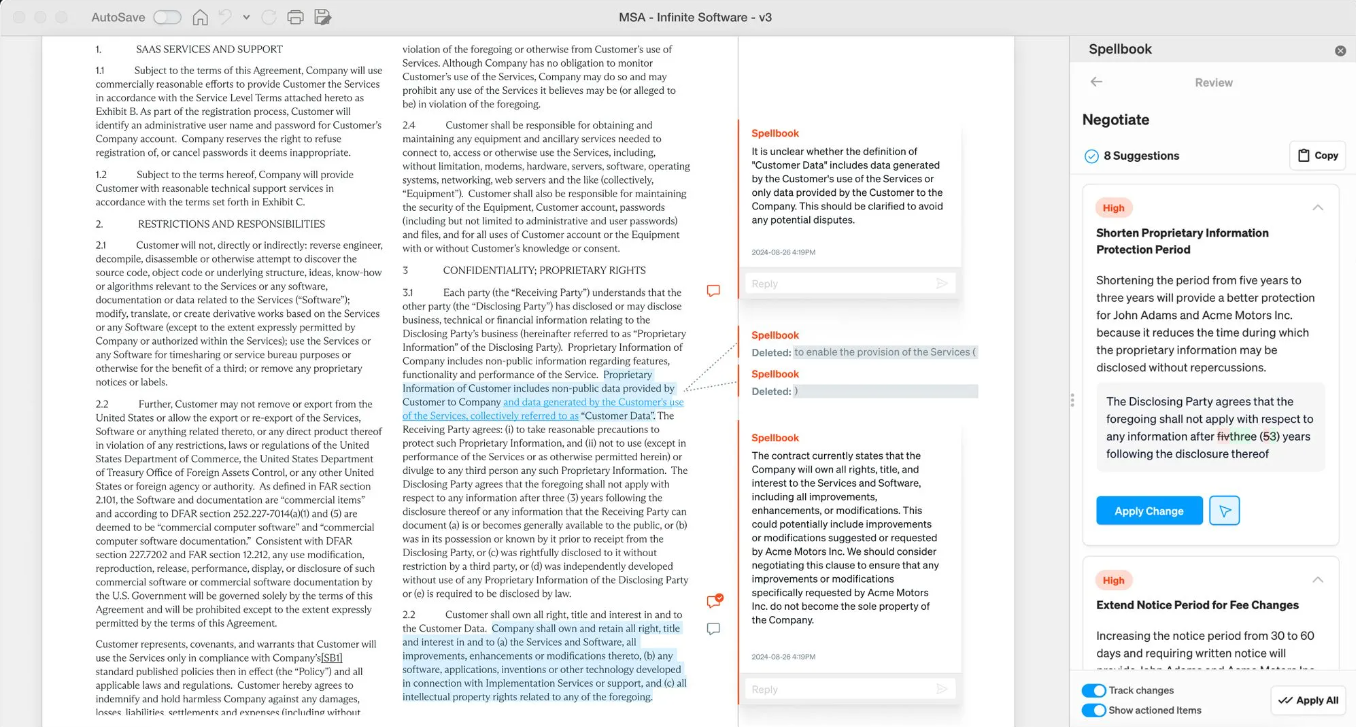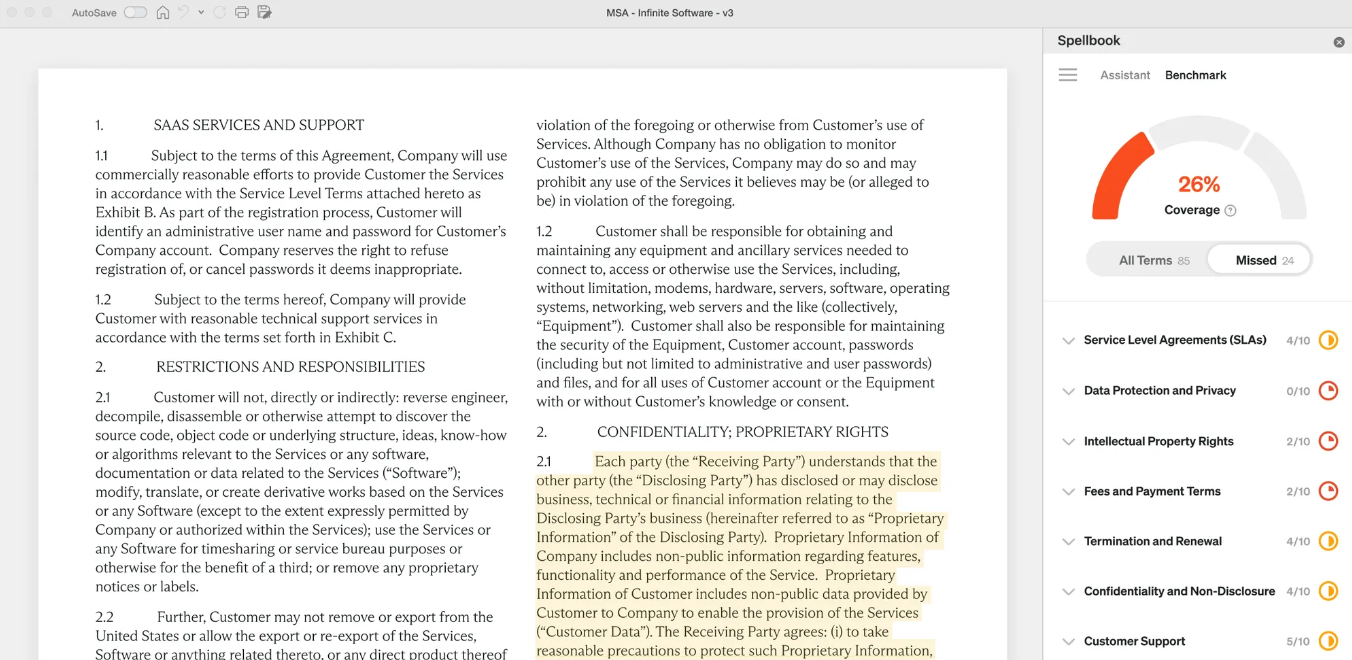
How is AI Transforming the Legal Profession? Risks and Opportunities

The legal profession has long been rooted in tradition, logic, and precision. Behind every strong argument and airtight contract lies hours of research, drafting, and documentation.
As legal data grows and demand for faster service intensifies, lawyers are recognizing that traditional, manual work methods no longer suffice. Embracing AI-powered solutions has become essential to staying competitive.
AI tools could help automate an estimated 44 percent of legal tasks in the US. What began as support for legal research has evolved into a suite of sophisticated tools that can help lawyers analyze risk, accelerate contract workflows, and reduce the time spent on manual tasks.
Tools such as Spellbook don’t just support legal work; they transform the delivery of legal services. Let’s take a closer look at how Spellbook can transform how law firms and in-house teams operate by automating routine legal tasks and processes. We explore the real risks and opportunities associated with AI, and examine how solutions like Spellbook are changing the way legal work gets done.
Key Areas of Legal Practice Revolutionized by AI
The promise of AI in law isn't about whether tools like ChatGPT will replace lawyers. It's about refining the way legal work is done. Solutions like Spellbook give lawyers back the time to focus on what truly demands their expertise, such as negotiation, strategy, ethical decisions, and client relationships.
But how does AI really reshape some of the most demanding and document-heavy aspects of legal practice?
Contract Drafting
Contract drafting is one of the easiest processes to automate with AI. For standard agreements, such as NDAs, service contracts, or partnership terms, AI can significantly reduce the time to produce a first draft.
For firms tracking efficiency metrics, the AI contract drafting ROI becomes clear: spending less time on repetitive contract writing and review results in more billable hours dedicated to legal strategy, negotiation, and client advisory work.
For example, Spellbook’s Draft feature automatically generates contract clauses and even full agreements by pulling from built-in and customizable templates and market-standard benchmarks.

One general counsel described how simply entering the core business terms and key constraints enabled Spellbook to return an applicable contract clause in seconds, complete with internal cross-references. A bit of fine-tuning, and the clause was ready to go in under 10 minutes.
Contract Review and Redlining
To illustrate how AI enhances document analysis, Spellbook's Review feature instantly scans contracts. It compares drafts against saved standards and industry benchmarks, flags potential risks, and suggests precise redlines, additions, deletions, and revisions—all without leaving Microsoft Word.

Beyond cutting review time by up to 80%, Spellbook lets you set custom rules for review and revision. Its Coverage Score rates how a contract stacks up against industry standards, while features such as Summarize Redlines and Ask help you navigate changes without clicking through endless tracked edits.
Benchmarking and Risk Assessment
Spellbook’s Benchmark feature automatically scans contracts against over 2,300 legal standards. It eliminates the anxiety of realizing you missed a crucial clause after a deal closed.

Missing clauses get flagged in red, and with one click, AI generates fixes you can insert directly into your document. Benchmark enhances risk management, enabling firms to anticipate legal outcomes and proactively address issues before they escalate to litigation.
Tools like this highlight the broader benefits of AI agents for legal contract review, including enhanced risk detection and improved clause consistency and deal preparedness.
Integration of AI Tools with Existing Software
Spellbook integrates directly with Microsoft Word as a simple add-in that installs in seconds. All of Spellbook's AI-powered features work where you're already drafting, reviewing, and negotiating contracts.
If you can use Word, you can use Spellbook. There's no switching between applications or disruption to your everyday workflows.
Challenges and Opportunities in AI Adoption for Law Firms
AI’s potential is massive, but adoption isn’t without hurdles.
Overcoming Resistance to AI in Legal Firms
Law firms, especially traditional ones, tend to be cautious by nature. Concerns over job displacement, ethics, and data privacy can lead to hesitation. The ABA’s 2025 Legal Industry Report found firm-wide AI adoption lags behind individual usage, largely due to these concerns.
The solution is training, transparency, and tools that respect privacy. For example, Spellbook offers Zero Data Retention agreements, meaning Spellbook will not use your documents or inputs to train AI models or for any internal purposes.
Modern AI tools are also increasingly intuitive, making the learning curve manageable. Plus, investing in AI literacy can lead to faster adoption rates and greater ROI.
The Future of AI in Law
AI capabilities have already advanced beyond contract drafting and review. The next generation of legal AI tools will help lawyers predict legal outcomes, optimize strategic decisions, and enhance client interactions before a human lawyer intervenes.
Spellbook is preparing for this shift (and then some).

Its newest feature, Spellbook Associate, functions like an AI-powered junior lawyer. You can ask the Associate to simplify dense language, brainstorm standard clauses, or walk you through how force majeure works in Ontario.
You can also delegate legal projects to Spellbook Associate, and it will break the work into manageable steps. In response to your input, it will adjust its approach if something changes midstream. As always, you remain in control of edits, approvals, and final outputs.
Features like these demonstrate how legal AI use will continue to evolve and become increasingly indispensable to legal professionals across all practice areas.
Future of AI in Legal: What’s Next?
At the recently concluded Legalweek 2025, one thing was clear: Lawyers stopped asking whether AI belongs in law. They started asking, "How can we make this work better for us?"
Here are four innovations set to define the next phase of legal AI:
Upcoming Innovations in Legal AI
1. Automated Contract Negotiation
Through advanced large language models (LLMs) and legal playbooks, AI will continue to enhance its ability to learn from prior negotiations. It will be able to simulate human-like negotiation processes based on a firm’s risk profile.
2. Deeper AI Integration for Compliance Checks
Advanced tools use machine learning (ML) to scan contracts in seconds, cross-check against jurisdiction-specific rules, and alert teams when new laws or standards emerge. Legal teams can trace how an AI tool made its recommendation, which adds a layer of transparency that is critical for compliance-heavy practices.
3. Predictive Analytics
AI plays an increasingly active role in legal strategy by forecasting potential outcomes. Predictive models can estimate success rates, highlight negotiation red flags, and suggest optimal deal structures.
4. From Billable Hours to Outcome-Based Pricing
Some 39% of private practice lawyers are now exploring value-based pricing models, especially for AI-assisted tasks. The vision is to tie pricing more directly to results, helping clients understand the services they pay for, rather than charging for billable hours.
Not all of these features are currently available in Spellbook, but our roadmap is dynamic, shaped directly by user feedback, and designed to keep pace with how lawyers actually work.
Future iterations are guided by one core idea: to solve your real, everyday pain points. This involves reducing legal drudgery, increasing consistency, and giving you better control of your work without requiring extensive technical expertise.
Key Takeaways
- AI is rapidly transforming legal workflows and now automating nearly half of all legal tasks.
- Spellbook helps lawyers work faster and with fewer errors through smarter contract drafting and improved legal document review.
- The future of AI is about more efficient and collaborative work between humans and technology, where lawyers remain in control and AI quietly makes complex aspects easier.
Frequently Asked Questions
Is AI Going to Replace Lawyers?
No. AI is a useful tool, not a substitute for legal expertise. AI increases operational efficiency and optimizes client services by automating tasks, accelerating workflows, and enhancing decision-making accuracy.
How Can Small Law Firms Benefit from AI Technology?
AI levels the playing field for small firms by reducing the time lawyers spend on manual tasks, enhancing document review, and streamlining compliance monitoring.
Can AI Help Law Firms with Billing and Client Communication?
Absolutely. Among its many other benefits, AI can automate billing tasks, track time more accurately, and respond to common client questions via chatbots. Its benefits lead to reduced legal costs and enhanced client satisfaction.
Thank you for your interest! Our team will reach out to further understand your use case.






